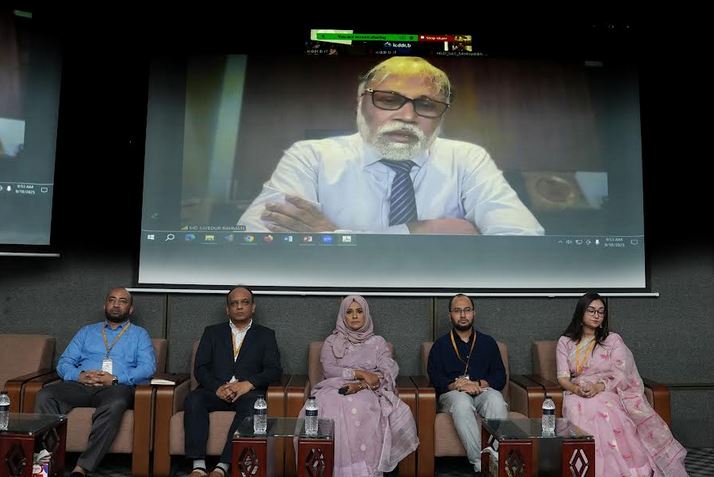News Flash

DHAKA, Sept 18, 2025 (BSS) – A study conducted by icddr,b has revealed widespread colonisation with drug-resistant pathogens in Bangladesh, with particularly alarming levels among newborns admitted to neonatal intensive care units (NICUs).
The findings were disseminated today at a seminar titled “Addressing Antimicrobial Resistance in Bangladesh: Insights from the ARCH Study” held at the Sasakawa Auditorium of icddr,b’s Mohakhali campus, according to an icddr,b press release .
Dr Fahmida Chowdhury, Associate Scientist and Lead of the Antimicrobial Resistance (AMR) Research Unit at icddr,b, presented the results of the multi-country Antibiotic Resistance in Communities and Hospitals (ARCH) study, supported by the US Centres for Disease Control and Prevention (CDC) and the Task Force for Global Health (TFGH).
The ARCH study, the first of its kind in Bangladesh, systematically investigated colonisation of antimicrobial resistant pathogens in both community and hospital settings. Colonisation refers to the presence of bacteria in or on the body without immediate disease symptoms, but with the potential to spread and cause hard-to-treat infections.
ARCH 1.0, conducted in 2019, found high levels of resistant bacteria among both healthy individuals and hospitalised patients. Extended-spectrum cephalosporin-resistant Enterobacterales (ESCrE) were highly prevalent in communities (78 percent) and hospitals (82 percent).
Carbapenem-resistant Enterobacterales (CRE) were significantly more common in hospitals (37 percent) compared to communities (9 percent).
Colistin-resistant Enterobacterales (ColRE) were detected in 11 percent of community members and 7 percent of patients, while one in five participants carried methicillin-resistant Staphylococcus aurous (MRSA).
Whole-genome sequencing of over 2,600 isolates revealed wide genetic diversity among resistant bacteria, underscoring challenges in treatment.
Besides, ARCH 2.0 provided further evidence on the impact of AMR in critical care settings. In NICUs, 81 percent of admitted newborns (342 out of 423) were colonised with carbapenem-resistant Klebsiella pneumoniae (CR-Kpn), identified by WHO as a top priority pathogen.
More than half of these newborns (70 percent) acquired CR-Kpn after 48 hours of hospitalisation, confirming high risk of hospital-acquired colonisation.
In adult ICUs, 60 percent of patients carried CRE, with colonisation linked to higher infection rates and longer hospital stays.
The study also tracked mother–child pairs, finding that around 40 percent of infants were colonised with CRE and nearly 90 percent with ESCrE within their first year of life.
Babies who stayed in hospital for more than 72 hours after birth bore the highest burden of colonisation. By one year of age, more than 80 percent of these infants had received at least one course of antibiotics, raising concerns about micro biome disruption and resistance development.
Encouragingly, the study demonstrated that infection prevention and control (IPC) measures such as improved hand hygiene among healthcare workers and enhanced environmental cleaning could significantly reduce colonisation rates and bloodstream infections in NICUs.
Speaking as chief guest joining virtually, Special Assistant on Ministry of Health and Family Welfare Professor Dr Md Sayedur Rahman termed the findings “extremely alarming yet valuable,” adding that they would guide strategies and interventions to combat AMR.
icddr,b Executive Director Dr Tahmeed Ahmed said that strong restrictions are needed to curb misuse of antibiotics, similar to the controls earlier placed on sedatives. “Antimicrobial resistance is a multisectoral problem that requires a health systems approach,” he said.
US CDC Acting Country Director Brian Wheeler stressed that AMR is a complex, global challenge requiring multifaceted solutions, with implications not only for science but also for health economics and policy.
IEDCR Director Prof Dr Tahmina Shirin, Additional Director General of DGHS Prof Dr Sheikh Sayidul Haque and Joint Secretary of the Ministry of Health and Family Welfare Dr Md Shibbir Ahmed Osmani also spoke on the occasion.
The seminar was attended by senior government officials, public health experts, clinicians, hospital managers and development partners, who underscored the urgent need for stronger surveillance, better hospital infection control, and rational antibiotic use to preserve the efficacy of life-saving medicines for future generations.